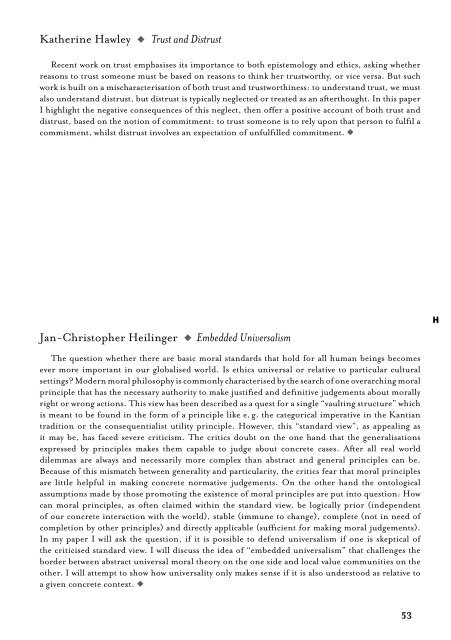Verlag.Buchhandel.Service. - Österreichische Gesellschaft für ...
Verlag.Buchhandel.Service. - Österreichische Gesellschaft für ...
Verlag.Buchhandel.Service. - Österreichische Gesellschaft für ...
Sie wollen auch ein ePaper? Erhöhen Sie die Reichweite Ihrer Titel.
YUMPU macht aus Druck-PDFs automatisch weboptimierte ePaper, die Google liebt.
Katherine Hawley ◆ Trust and Distrust<br />
Recent work on trust emphasises its importance to both epistemology and ethics, asking whether<br />
reasons to trust someone must be based on reasons to think her trustworthy, or vice versa. But such<br />
work is built on a mischaracterisation of both trust and trustworthiness: to understand trust, we must<br />
also understand distrust, but distrust is typically neglected or treated as an afterthought. In this paper<br />
I highlight the negative consequences of this neglect, then offer a positive account of both trust and<br />
distrust, based on the notion of commitment: to trust someone is to rely upon that person to fulfil a<br />
commitment, whilst distrust involves an expectation of unfulfilled commitment. ◆<br />
Jan-Christopher Heilinger ◆ Embedded Universalism<br />
The question whether there are basic moral standards that hold for all human beings becomes<br />
ever more important in our globalised world. Is ethics universal or relative to particular cultural<br />
settings? Modern moral philosophy is commonly characterised by the search of one overarching moral<br />
principle that has the necessary authority to make justified and definitive judgements about morally<br />
right or wrong actions. This view has been described as a quest for a single “vaulting structure” which<br />
is meant to be found in the form of a principle like e. g. the categorical imperative in the Kantian<br />
tradition or the consequentialist utility principle. However, this “standard view”, as appealing as<br />
it may be, has faced severe criticism. The critics doubt on the one hand that the generalisations<br />
expressed by principles makes them capable to judge about concrete cases. After all real world<br />
dilemmas are always and necessarily more complex than abstract and general principles can be.<br />
Because of this mismatch between generality and particularity, the critics fear that moral principles<br />
are little helpful in making concrete normative judgements. On the other hand the ontological<br />
assumptions made by those promoting the existence of moral principles are put into question: How<br />
can moral principles, as often claimed within the standard view, be logically prior (independent<br />
of our concrete interaction with the world), stable (immune to change), complete (not in need of<br />
completion by other principles) and directly applicable (sufficient for making moral judgements).<br />
In my paper I will ask the question, if it is possible to defend universalism if one is skeptical of<br />
the criticised standard view. I will discuss the idea of “embedded universalism” that challenges the<br />
border between abstract universal moral theory on the one side and local value communities on the<br />
other. I will attempt to show how universality only makes sense if it is also understood as relative to<br />
a given concrete context. ◆<br />
53<br />
H


